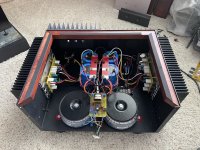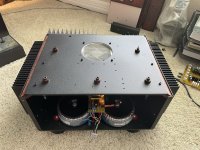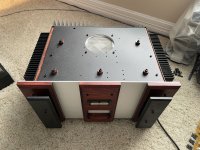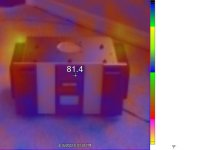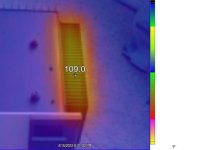Thanks all for your help! Time to redesign the enclosure with larger heat sinks on the sides! That's what you get trying to scavenge and save a few bucks! lol
@Mikerodrig27 , I would appreciate the Aleph Mini schematics.
@Mikerodrig27 , I would appreciate the Aleph Mini schematics.
Last edited:
Mini Aleph:
Grey's original version: https://www.diyaudio.com/community/threads/the-mini-a.2001/
BrianGT's version (adapted from A30): https://www.diyaudio.com/community/threads/aleph-with-briangt-boards.204748/#post-2867253
Grey's original version: https://www.diyaudio.com/community/threads/the-mini-a.2001/
BrianGT's version (adapted from A30): https://www.diyaudio.com/community/threads/aleph-with-briangt-boards.204748/#post-2867253
I just measure sink temps...if I can't keep my hands on sink for more than 5-10 seconds after a 1/2 hour to an hour of operation, then its over 140F... add R to get CRC filter to drop rail voltages to get sinks back at / under 140F.
Using Duncan amps program really helps.
But we can already see you have insufficient heat sinking...
Using Duncan amps program really helps.
But we can already see you have insufficient heat sinking...
Okay, attached are some things I collected on the Aleph Mini in no particular order. Also attached is an Aleph power and dissipation spreadsheet.
There is also a link to a build guide on an aleph mini on the Aleph UMS page
https://www.diyaudio.com/community/...or-modern-ums-chassis-builders-thread.382316/
There is also a link to a build guide on an aleph mini on the Aleph UMS page
https://www.diyaudio.com/community/...or-modern-ums-chassis-builders-thread.382316/
Attachments
Yeah, no problem. I had a little Aleph Mini. It was a spectacular little amp. I ran mine with two IRFP150's. It wasn't the most dynamic (good for what it was) However, voices, imaging and soundstage were really nice. Altering yours to a mini should only require removing parts. You may even be able to only remove the sources and gates on the MOSFETs you are not using.
Thanks to all for helping me with my amplifier temperature management issue. I was able to redesign the temperature transfer and everything looks good. I'm finally done with the amp (yes, I was still building it!), and the temperature has stabilized. Photos attached. The fan can be activated or deactivated with a switch and it is not adding any vibration or noise to the audio signal.
Attachments
Nice. I assume 109 degrees Fahrenheit which is pretty cool for an aleph. Don't be afraid to go up to 50 degrees celsius which is roughly 120 degrees Fahrenheit after you burn things in and test it for a while.
- Home
- Amplifiers
- Pass Labs
- Pass Aleph 5
